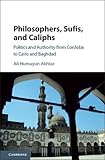Philosophers, sufis, and caliphs [Texte imprimé] : politics and authority from Cordoba to Cairo and Baghdad / Ali Humayun Akhtar
نوع المادة : نصتفاصيل النشر:Cambridge ; New York ; Melbourne [etc] : Cambridge University Press, cop 2017وصف:1 vol. (XIII-262 p.) : ill., cartes, couv. ill. ; 24 cmتدمك:
نصتفاصيل النشر:Cambridge ; New York ; Melbourne [etc] : Cambridge University Press, cop 2017وصف:1 vol. (XIII-262 p.) : ill., cartes, couv. ill. ; 24 cmتدمك:- 978-1-1071-8201-1
- 956.05 23A
- 956.05
| نوع المادة | المكتبة الحالية | المجموعة | رقم الطلب | رقم النسخة | حالة | تاريخ الإستحقاق | الباركود | |
|---|---|---|---|---|---|---|---|---|
|
|
Bibliothèque centrale En accès libre | Collection générale | 956.05 / 640 (إستعراض الرف(يفتح أدناه)) | 1 | المتاح | 000006846299 |
Bibliogr. p. 241-258
Introduction : Politics, Law, and Authority in the Abbasid and Fatimid Eras -- Philosophical Caliphs in Baghdad and Cairo and the Debate about falsafa -- A New Caliph in Cordoba and a Theologian's Reform of Philosophy -- Political Reform in Baghdad and its Legacy in Seville -- Sufis among Scholars in the Almoravid Era -- A Sufi Revolt in Portugal and its Platonizing Political Leadership -- Almohad Political Culture and the Patronage of Philosophy and Mysticism
What was the relationship between government and religion in Middle Eastern history? In a world of caliphs, sultans, and judges, who exercised political and religious authority? In this book, Ali Humayun Akhtar investigates debates about leadership that involved ruling circles and scholars of jurisprudence and theology. At the heart of this story is a medieval rivalry between three caliphates: the Umayyads of Cordoba, the Fatimids of Cairo, and the Abbasids of Baghdad. In a fascinating revival of Late Antique Hellenism, Aristotelian and Platonic notions of wisdom became a key component of how these caliphs debated their authority as political leaders. By tracing how these political debates impacted the theological scholars and their own conception of communal guidance, Akhtar offers a new picture of premodern political authority and the connections between Western and Islamic civilizations. It will be of use to students and specialists of the premodern and modern Middle East
لا توجد تعليقات على هذا العنوان.


